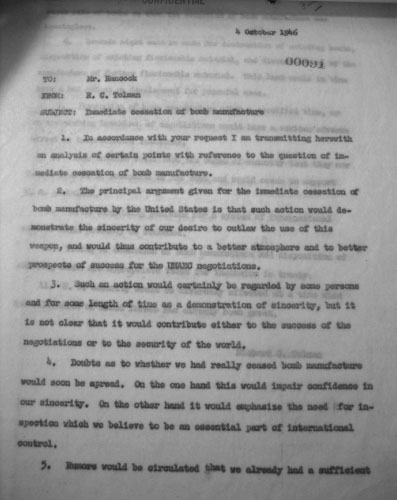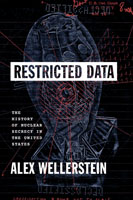For a brief moment after the end of World War II, the fate of the American nuclear arsenal was unknown. The Manhattan Project had built up a sprawling network of laboratories, production facilities, and administrative offices. But the idea of international control was in the air: the idea that there wouldn’t be a nuclear arms race at all, that somehow the world would find a way to outlaw proliferation before it even began.
It didn’t happen that way, as we well know. Perhaps it was a pipe dream from the start: we also now know that the Soviet Union was fairly dedicated to the idea of getting an atomic bomb of its own, and had been working on it for a number of years at that point. Still, the idea of “international control of atomic energy” is worth taking seriously from an historical mindset: it wasn’t at all clear that the Cold War was going to shake out the way it did, in those early days. And much of what was hoped for did eventually take form in the Nuclear Non-Proliferation Treaty — with the obvious exception that the five big nuclear states got to keep their arsenals.
In this context, today’s weekly document is a memo by Richard C. Tolman, the Caltech physicist who had been General Groves’ scientific advisor during the war, and who served as the scientific advisor to Bernard Baruch, presenter of the ill-fated “Baruch Plan” for international control to the United Nations. 1
A meeting of the UN Atomic Energy Commission in October 1946. Baruch is the white-haired man sitting at the table at right behind the “U.S.A” plaque. At far top-right of the photo is Robert Oppenheimer. Two people above Baruch, in the very back, is General Groves. Directly below Groves is Richard Tolman. British physicist James Chadwick sits directly behind the U.K. representative at the table.
Tolman’s memo is an analysis of the question of whether the United States should immediately stop producing more atomic bombs. This sounds like something of a heresy to our modern ears — the US stop producing atomic bombs, right at the dawn of the Cold War? — but as Tolman discusses, there were those thought that it might be a little hard to convince the USSR that you’re willing to submit to international control restrictions when you’re still expanding your nuclear arsenal.
Tolman was no radical scientist — he was fairly old, he was politically conservative, and he usually came to the same conclusions as General Groves. His analysis on the cessation issue was also fairly conservative: he pointed out that even if the production of bombs was stopped, there would be no pleasing the Soviets with it, since they would argue that production was going on in secret, or that the US probably already had a big stockpile saved up. (The former point, Tolman notes, might emphasize the importance of inspection, which would become the sticking point of the Baruch Plan. On the latter point, I am not sure whether Tolman knew that that the US stockpile was quite small at that point, but he might have.)
Moreover, Tolman argued that if they made a big deal of stopping, and then later decided to resume production, it would have “a serious adverse effect on international relations.”
Still, the fact that Tolman had to go through and make a systematic (and classified) analysis of the issue tells us a lot about the period — it wasn’t an unthinkable idea that the US might have stopped producing nuclear weapons. Within a few years, of course, such an idea would enter into the unthinkable domain, at least for those in positions of influence, and stay there for much of the Cold War.
- Richard C. Tolman to John M. Hancock, “Immediate cessation of bomb manufacture,” (4 October 1946), in National Archives, Records of the Office of Scientific Research and Development, RG 227, Files of Richard C. Tolman, S-1 Files, Box 1, “Atomic Energy Commission.”[↩]



If the US did immediately stop producing nuclear weapons, would there have been a ‘cold’ war? Wouldn’t it have simply become a regular war, seeing as the idea of mutual destruction wouldn’t have existed without nuclear weapons?
It’s a good, tough question, Charles. One thing that’s worth considering is whether the cessation of weapons production would have meant the cessation of fissile material production. If not, then the US wouldn’t actually be in any worse situation than it already was at that time — it didn’t have any assembled weapons through 1947, though it did have fissile material for them (and other non-nuclear components). I think from a military point of view, it wouldn’t have changed weapons availability too much at that point — just because they didn’t have very many available. Whether that would have emboldened Stalin, it’s hard to say. I’m not much of a fan of the “Cold War could have been avoided” arguments — the mutual desire for security of the US and the USSR, and their justified mutual suspicion of one another, seem hard to break out of — but it’s interesting to contemplate.
[…] Tolman, General Groves’ technical advisor, reviewed this article shortly after it was published. He wasn’t too concerned with the […]